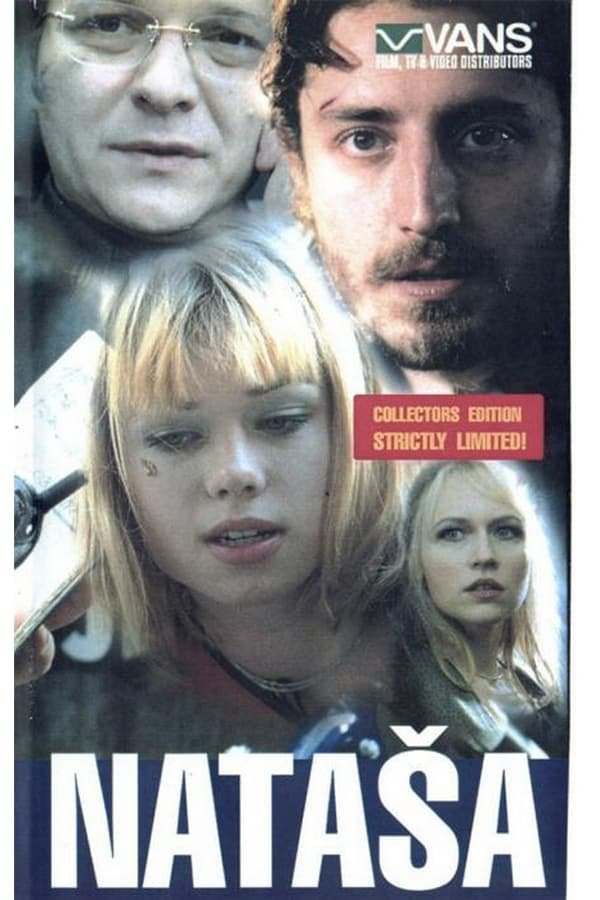Film Review: Natasha (Nataša, 2001)

Serbian actor Ljubiša Samardžić, once among the greatest stars of Yugoslav cinema, has, following the dissolution of the federation, found new and successful career as producer. He also dabbled in directing, with first two of his directorial efforts dealing with some of the most important chapters of recent Serbian history only months after the events. The first one, 2000 drama Sky Hook, dealt with devastating 1999 NATO bombing of Serbia, while the sceond, 2001 thriller Natasha, became the first film to deal with the overthrow of Serbian leader Slobodan Milošević, which had occurred only few months earlier.
The protagonist, played by Tijana Kondić, is Nataša, 17-year old girl from Belgrade. A year earlier she witnessed assassination of her father, police inspector Toša (played by Samardžić). Two weeks before the 2000 presidential election, when Milošević’s regime begins to crumble, Nataša decides to find people responsible by stealing a mobile phone and sending threatening message to people who suspects to be involved. Her quest is helped by Marko (played by Nikola Đuričko), book store owner who is, despite age difference, attracted to Nataša. Marko’s good friend Kiza (played by Davor Janjić), man who moves in circles between police and organised crime, also takes interest in Nataša and what began as child’s play turns into something quite serious.
Script by Srđan Koljević and Đorđe Milosavljević represents combination of black comedy, melodrama and political thriller where the various genre elements aren’t properly balanced. Thankfully, Samardžić, who had long and prolific career, apparently learned a thing or two about work behind the camera and Natasha is well directed. Although cinematography at times looks a little bit too dark, atmosphere of government changing is brought to screen in convincing manner. Like in many Serbian films at the time, the cast is very good. Veterans like Davor Janjić, Anica Dobra (playing Marko’s wife) and Dragan Bjelogrlić (in the role of Milošević’s secret police chief) are good, but even more impressive is young Tijana Kondić in title role. Sadly, her performance in Natasha failed to launch promising career. Samardžić could have made even better film if not for trying a little bit too hard to convince foreign, mainly Western, audience that 1990s Serbia was something more than Milošević’s thuggery and warlike nationalism and that there were people who adopted liberal Western values, thus becoming regime’s victims in the process. One such attempt can be seen in the character of transvestite Dženi (played by Boris Milivojević) which seems to be introduced only to fill certain quotas that were becoming the norm in Hollywood and other Western cinema industries at the time. Despite that, and somewhat confusing ending, Natasha is still a good film that can be recommended even to audience that isn’t particular curious about recent history of Serbian cinema.
RATING: 5/10 (++)
Blog in Croatian https://draxblog.com
Blog in English https://draxreview.wordpress.com/
Leofinance blog https://leofinance.io/@drax.leo
Cent profile https://beta.cent.co/@drax
Minds profile https://www.minds.com/drax_rp_nc
Uptrennd profile https://www.uptrennd.com/user/MTYzNA
Unstoppable Domains: https://unstoppabledomains.com/?ref=3fc23fc42c1b417
Hiveonboard: https://hiveonboard.com?ref=drax
Bitcoin Lightning HIVE donations: https://v4v.app/v1/lnurlp/qrcode/drax
Rising Star game: https://www.risingstargame.com?referrer=drax
1Inch: https://1inch.exchange/#/r/0x83823d8CCB74F828148258BB4457642124b1328e
BTC donations: 1EWxiMiP6iiG9rger3NuUSd6HByaxQWafG
ETH donations: 0xB305F144323b99e6f8b1d66f5D7DE78B498C32A7

Thanks for this review of a period of history largely ignored in the West. I would like to be able to access Yugolsav films from the Black Wave 70s. Do you know any sites that caters for that genre?
Some modern Serbian film makers have criticised modern Serbian cinema for being merely a channel to put across EU themes of reconciliation and contrition for the Balkan Wars of the 90s. What do you make of this viewpoint?
EU themes in Serbian cinema are reflection of EU subsidies for Serbian films. Serbia has relatively small domestic market and it is very diificult for a film to be commercially viable. Many film makers take the easy route of taking money from EU or Serbian government and adapt content of their films according to their financiers' agenda.
This issue is even more noticeable in Croatia, which is a smaller country with smaller domestic market and less ability for commercial or audience-friendly content to slip through.
Thank you for your insightful comment. I came across a critique, by the director of A Serbian Film, who was very critical of the way films are funded in Serbia. I seem to recall him claiming that this limited artistic freedom for film makers. Yet there are Serbian film makers like Kustirica who have had successful careers and appear to have maintained their artistic freedom. Maybe I don't know enough about his career and why he has been successful.
Maybe governments need to take the attitude of the French towards nurturing and protecting their domestic film industries without interfering with the artistic process.